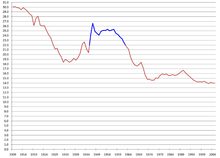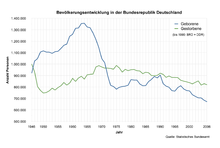Baby boomers
![]()
This article or section needs revision. More details should be given on the discussion page. Please help improve it, and then remove this tag.
Baby boomers, baby boomers, or boomers refer to both individuals and the entirety of the cohort or social generation born during the periods of rising birth rates (the "baby boom") after World War II or other wars in the war-affected states. For clarification, the term boom generation is sometimes used for the totality.
The baby boom occurred in both the winning and losing states of the Second World War and in neutral states, but at different times. In the USA, Australia, Canada and New Zealand, birth rates, including age-specific ones, i.e. those relating to specific age groups, had fallen to a low point during the Great Depression. Thereafter, fertility rose until the 1960s. In some countries birth rates already rose during the Second World War, e.g. in Switzerland, the Netherlands, France, Belgium, Great Britain, Denmark, Finland, Norway. In Switzerland, the cohorts 1946 to 1964 are considered baby boomers; however, birth rates initially fell again from the end of the Second World War. In West Germany, the baby boom did not begin until the mid-1950s due to the consequences of the war, for example because of the late return of prisoners of war, replaced the generation of the so-called war children and lasted there until the mid-1960s. Fertility rates rose until 1964, and for women up to 25 years old they continued to rise until the end of the decade. After the war (1946-1950), fertility rates in Germany were still low. After the end of the Korean War in 1953, the baby boom in South Korea lasted from 1955 to 1963. In Japan, birth rates peaked in the late 1960s and early 1970s.
The baby boom was the only period since the end of the 19th century in which the fertility rate rose again; its subsequent decline is known as the pill bust.

Birth rate in the U.S. (per 1000 population), the blue area from 1946 to 1964 is the postwar baby boom.
Germany
In Germany, statisticians refer to those born between 1955 and 1969 as the baby boomers. In the United States, this age cohort corresponds more to the so-called Jones generation, both in terms of age and typical habitus. Births peaked in 1964 with 1,357,304 live births. From 1965 onwards, the so-called pill kink set in: the birth rate declined and finally fell below the 1955 level in 1970; from 1972 onwards, the birth rate was below the death rate. In the long term, the downward trend in birth rates has continued until today; in 2002, the number of births was only half as high as in 1964. Although the baby-boom generation is a powerful demographic factor, there are no studies with clear results on their attitude to life and their type of socialisation. On the other hand, statements based on assumptions, speculations and interpretations are increasingly being made in the media and in the economy.

Demography of Germany: births and deaths in Germany
Economy and politics
The numerical strength of the baby boomers has also made them an important factor in political efforts to manage demographic change. Thus, this generation is partly affected by the consequences of the economic and social challenges. The increase in the retirement age in the statutory pension insurance system to 67 in spring 2007 primarily affects the younger cohorts of baby boomers (from 1965) and the following cohorts.
The cohorts 1945-1969 make up 58% of the members of the 19th German Bundestag in Germany. In this age grouping, however, the baby boomers are combined with older cohorts who, from a socio-psychological point of view, are rather to be assigned to the so-called war children and the so-called 68ers.
Questions and Answers
Q: What does the term baby boomer mean?
A: The term baby boomer refers to people born during the years 1946 to 1964 worldwide.
Q: What is the range of years for baby boomers in Canada?
A: In Canada, baby boomers are anyone born between 1960 and 1980.
Q: Who is identified as baby boomers in Australia?
A: In Australia, baby boomers are those born between 1946 and 1961.
Q: When did the birth rate start falling?
A: Generally, after 1960 the birth rate started falling.
Q: Who first used the term baby boom for the rapid rise in birthrate after Word War II?
A: Sylvia F. Porter, a columnist for the New York Post, first used the term baby boom for the rapid rise in birthrate after Word War II.
Q: What caused the rapid rise in birthrate after Word War II?
A: The rapid rise in birthrate after World War II is believed to have been caused by an increase in optimism, prosperity and hope for the future after the war had ended.
Q: How long does the baby boomer period last?
A: The baby boomer period generally lasts from 1946 to 1964 worldwide.
Search within the encyclopedia